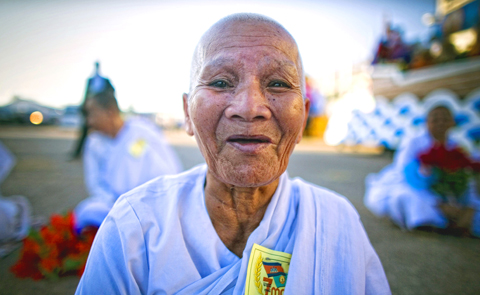Tens of thousands of Cambodians yesterday cheered the 30th anniversary of the ouster of the brutal Khmer Rouge regime at an elaborate stadium ceremony held by the country’s powerful ruling party.
About 40,000 people attended the celebration three decades to the day in 1979 when Vietnamese-led forces entered Phnom Penh and toppled the Khmer Rouge, which is blamed for the deaths of up to two million people.
Prime Minister Hun Sen and members of the ruling Cambodian People’s Party (CPP) applauded at the capital’s Olympic Stadium while hundreds of traditional Khmer dancers, a marching band and parade floats streamed past.

PHOTO: AP
“The victory of January 7 saved the fatherland and people of Cambodia in a timely manner,” party president Chea Sim told the crowd in a speech.
He said the anniversary marked the end of “the dark chapter of Cambodian history” and thanked neighboring Vietnam for “saving the country from genocide” and reviving the nation.
Armed forces and boy scouts stood to attention on the stadium field in front of a large swivelling statue of the ruling party’s symbol, an angel throwing flowers.
White-clad celebrants in the stands held signs that showed images of doves and spelled “Bravo the 30th Anniversary of the Fall of the Khmer Rouge.”
The pageant ended with the release of doves and colorful balloons into the air.
The Khmer Rouge came to power in 1975 and is accused of killing millions through overwork, execution or starvation before it was ousted by a Hanoi-backed military force in January 1979.
The CPP has ruled Cambodia since it was installed by Hanoi at the time, and Chea Sim went on to outline government successes in developing the impoverished country while thanking citizens for supporting the ruling party.
But Chea Sim made no mention in his speech of the UN-backed war crimes trial of surviving Khmer Rouge leaders, expected to begin within the next few months.
Khmer Rouge “Brother Number One” Pol Pot died in 1998, but five surviving regime leaders are due to be tried for war crimes and crimes against humanity, after delays over the last decade amid concerns over political interference.
Rights groups and some opposition politicians have accused the government of trying to derail the trials for fear of exposing atrocities committed by former regime cadres currently serving in Hun Sen’s administration.
Human Rights Watch this week accused Hun Sen and the CPP of trying to obstruct more prosecutions.
It made the claim after a disagreement emerged between the court’s international and Cambodian co-prosecutors about whether additional cases against other senior Khmer Rouge leaders would threaten Cambodia’s stability.
Some Cambodians also criticize the Jan. 7 anniversary, saying it represents the takeover of a repressive Vietnamese regime which held the country for a dozen years, rather than a day of liberation.
Hun Sen on Tuesday lashed out at those who did not celebrate the 30th anniversary, calling them “animals.”
Hun Sen himself was a Khmer Rouge military commander until he escaped to Vietnam, and returned as part of the forces that helped overthrow the regime.

IDENTITY: A sex extortion scandal involving Thai monks has deeply shaken public trust in the clergy, with 11 monks implicated in financial misconduct Reverence for the saffron-robed Buddhist monkhood is deeply woven into Thai society, but a sex extortion scandal has besmirched the clergy and left the devout questioning their faith. Thai police this week arrested a woman accused of bedding at least 11 monks in breach of their vows of celibacy, before blackmailing them with thousands of secretly taken photos of their trysts. The monks are said to have paid nearly US$12 million, funneled out of their monasteries, funded by donations from laypeople hoping to increase their merit and prospects for reincarnation. The scandal provoked outrage over hypocrisy in the monkhood, concern that their status

The United States Federal Communications Commission said on Wednesday it plans to adopt rules to bar companies from connecting undersea submarine communication cables to the US that include Chinese technology or equipment. “We have seen submarine cable infrastructure threatened in recent years by foreign adversaries, like China,” FCC Chair Brendan Carr said in a statement. “We are therefore taking action here to guard our submarine cables against foreign adversary ownership, and access as well as cyber and physical threats.” The United States has for years expressed concerns about China’s role in handling network traffic and the potential for espionage. The U.S. has

Trinidad and Tobago declared a new state of emergency on Friday after authorities accused a criminal network operating in prisons across the country of plotting to kill key government officials and attack public institutions. It is the second state of emergency to be declared in the twin-island republic in a matter of months. In December last year, authorities took similar action, citing concerns about gang violence. That state of emergency lasted until mid-April. Police said that smuggled cellphones enabled those involved in the plot to exchange encrypted messages. Months of intelligence gathering led investigators to believe the targets included senior police officers,

A disillusioned Japanese electorate feeling the economic pinch goes to the polls today, as a right-wing party promoting a “Japanese first” agenda gains popularity, with fears over foreigners becoming a major election issue. Birthed on YouTube during the COVID-19 pandemic, spreading conspiracy theories about vaccinations and a cabal of global elites, the Sanseito Party has widened its appeal ahead of today’s upper house vote — railing against immigration and dragging rhetoric that was once confined to Japan’s political fringes into the mainstream. Polls show the party might only secure 10 to 15 of the 125 seats up for grabs, but it is